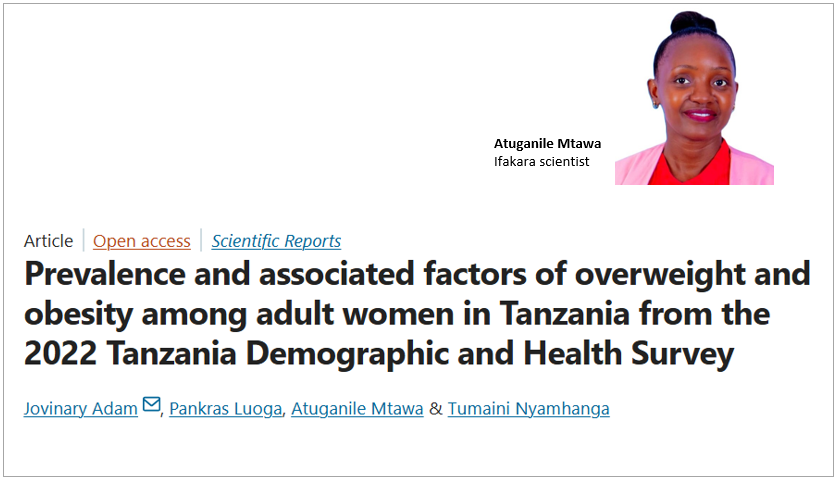
LIFESTYLE: Tanzania sees a worrying rise in overweight and obesity among women

At least one in three Tanzanian women – that’s 36 in every 100 – who are aged between 20 and 49 years are either overweight or obese, a new study has revealed, raising concerns about the growing burden of non-communicable diseases (NCDs) in the country.
The study, led by Tanzanian scientists with contributions from the Ifakara Health Institute (IHI), analyzed data from the 2022 Tanzania Demographic and Health Survey and Malaria Indicator Survey (TDHS–MIS). It found that 36% of women in this age group were overweight or obese.
The research, published on the journal Scientific Reports on September 30, 2025, warns that the trend—driven by changing diets and lifestyles—poses a threat to women’s health and the nation’s healthcare system.
Why the study matters
Overweight and obesity are major risk factors for chronic conditions such as diabetes, hypertension, and heart disease. Experts warn that if the trend continues—especially amid the rising burden of lifestyle-related diseases—Tanzania could face a growing health crisis that strains the healthcare system and threatens national health progress.
Researchers emphasize that understanding and addressing these factors will help empower women to take control of their health and combat overweight nationwide.
The study identified several factors significantly associated with overweight and obesity, including urban residency, older age, higher education level, higher economic status, consumption of unhealthy foods, smoking, and frequency of television watching.
Urban residency and lifestyles
The study shows that women living in urban areas are more likely to be overweight or obese than those in rural settings. Urbanization has largely changed eating habits, with many city residents opting for fast, affordable street foods often high in calories.
Limited green spaces, lack of pedestrian walkways, and reliance on motorized transport have also contributed to inactive lifestyles.
“The rise of convenient food options and sedentary work patterns in cities is fueling the obesity problem,” the researchers explained. “Many people now spend most of their day sitting — at work, in vehicles, and at home — with little time left for physical activity.”
Age, education, wealth and culture as key drivers
The study found that older women, those with higher education levels, and women from wealthier households were more likely to be overweight or obese.
Researchers suggest that lifestyle and behavioral changes accompanying these factors play a major role. Older women tend to engage in less physical activity, while educated and economically able women often face time constraints that limit exercise.
Social and cultural influences may also play a role. In many African settings, being overweight has historically been viewed as a symbol of beauty and or wealth, a perception that still influences women’s attitudes toward body size.
The role of diet and habits
The study also highlighted unhealthy eating habits, including the frequent consumption of sugary drinks and high-fat foods, as major contributors to weight gain. It further revealed a link between smoking and higher odds of obesity among women.
Another notable finding was that women who watched television less than once a week were more likely to be overweight compared to those who watched TV more often.
Call to action
The researchers urge the Ministry of Health and other health stakeholders to design targeted interventions focusing on women’s health and nutrition. Recommended actions include empowering women with health knowledge and economic opportunities and policies that make healthy foods more affordable and accessible.
“The Ministry of Health and other health stakeholders should design programs to combat overweight and obesity, targeting older women by incorporating health topics into the educational curriculum in Tanzania,” the authors concluded. “This approach will effectively empower women to combat overweight in the country.”
Read more, here.
